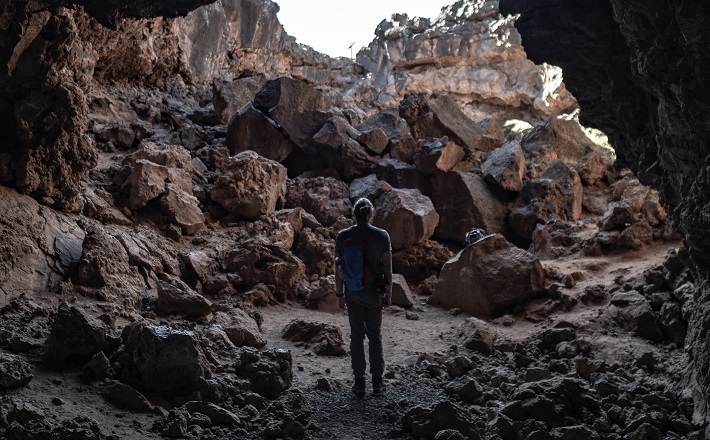Commentary on Ezekiel 37:1-14
What a story this is!
I teach near Hollywood, and so maybe that’s why I imagine this being filmed with a whole bunch of CGI animation, with God and Ezekiel flying around like superheroes. Then again, that might obscure the fact that there is serious theology undertaken here.
For one thing, there’s theological anthropology—that is to say, what is humanity made of? Ezekiel is working here from the idea that the spirit is something different from the flesh. God puts the bodies back together first: the bones and sinews, the muscles and skin … “but there was no breath in them”—no ruah—no spirit. Interestingly, though, that reverses the order from the prophecy: When Ezekiel announces the word of the Lord, he says first: “I will cause breath to enter you, and you shall live.” Then the physical restoration comes after that.
Why is that? Perhaps it’s because the restoration of the spirit is the more important promise.
The spirit marks this as a story of re-creation. At creation, the spirit is hovering over the face of the waters (Genesis 1:2). In Genesis 2:7, “the LORD God formed man from the dust of the ground” … but humankind was just this pile of dust until God “breathed into his nostrils the breath of life; and then the man became a living soul.” Physical stuff is not worth much without the spirit that is breathed by God.
Ezekiel’s re-creation story is of course different. It’s the story of the rebirth of a nation. Ezekiel is speaking to exiles and to those who have seen their city destroyed and their civilization seemingly stamped out. Judah’s life as a nation essentially came to an end with the Babylonian destruction of 586 BCE—they were flat-lining, as doctors say. But here, God offers to bring them back to life, and even to restore them to their land. Flesh and blood restored to the soil of Judah!
Hm, but wait: “Blood and soil”? … In German, that would be Blut und Boden. Now we are in dangerous territory. Can you hear the echoes? “Blood and soil” was a Nazi slogan.
The Bible uses “bone and flesh” as a motif for kinship. To take just one example, in Genesis 29, when Jacob comes to stay with Laban, Laban welcomes him with these words: “‘Surely you are my bone and my flesh!’ And [Jacob] stayed with him …” (Genesis 29:14) And the same two Hebrew words are used in Ezekiel for the bones and flesh that God brings back together in the valley.
This is, in a very real sense, a nationalistic text and an ethnocentric text. At least since there has been writing, nationalism has frequently been a powerful force in human cultures, lurking at the door. And still today it rears its head forcefully in the United States and in Europe. Citizens who self-identify as natives look at each other and say “you are my bone and my flesh,” and from there dangerous things happen.
For that reason, Ezekiel’s emphasis on spirit is important—because the spirit of God is something different from bone and flesh. When the Spirit of God moves, other things happen. Creation happens. And at Pentecost, the disciples “were filled with the Holy Spirit and began to speak in other languages, as the Spirit gave them ability” (Acts 2:4). Those who were filled with the Spirit did not band together and persecute those who spoke other languages; instead, they were empowered to share the gospel with them.
And what is the gospel that the Spirit empowers? In Luke 4:17-19, when “the scroll of the prophet Isaiah was given to him. He unrolled the scroll and found the place where it was written: ‘The Spirit of the Lord is upon me, because he has anointed me to bring good news to the poor. He has sent me to proclaim release to the captives and recovery of sight to the blind, to let the oppressed go free, to proclaim the year of the Lord’s favor.’” Then he rolls up the scroll and sits down. This is Jesus dropping the mic.
The things Jesus was sent to do, he sends us to do: “Go and do likewise.” And the agenda Jesus calls us to is a long way from the agendas of our nationalist parties today. It is important to resist these movements for the sake of the public good; that’s only what Jesus would have done. But it is just as important to resist for the sake of the church. So often these movements embrace Christianity as part of a nationalist program, and in doing so, they take the Lord’s name in vain. That way lies death for the church.
Ezekiel 37 makes a call on its hearers as well. It implies that “bone and flesh” or ”blood and soil” is just dead dust. There is no life apart from the God-breathed spirit. That’s why the prophet emphasizes the spirit, and why it is the climax of the passage. But through human history, we forget this again and again and again.
If it seems unlikely that Ezekiel meant something surprising and countercultural, consider the reaction of the bystanders when God used the Spirit to create in Acts 2. This is the point at which the Jesus movement ceases to be a bunch of shaggy fishermen following Jesus around, and begins to be the church—something international that reaches beyond its religious and cultural origins to embrace the world. And the world thinks it’s nuts. Just after the Spirit comes and disciples start speaking foreign languages, a lot of people in the crowd “sneered and said, ‘They are filled with new wine’” (Acts 2:13).
These are the same people who think it’s nuts to move beyond nationalism. They are the same ones today who sneer at “social justice warriors” on social media. A lot of the world doesn’t understand the Spirit, at some level even fears it. Because what the Spirit does, doesn’t make sense. The Spirit tells you that the blessings God has given—our minds, our lands, our money—are only ours to give away.
I have long been moved by the story of Les Miserables, particularly by the bishop who, after Jean Valjean steals most of his silver and is caught, sets him free and gives him the candlesticks as well. From Jesus’ giving away his life, to Bishop Myriel giving away his silver to Jean Valjean, to the ordinary gifts that we share every week or every month, giving it all away is the life of any church.
When we look out across the valley of dry bones that is our politics today, it would be understandable if we, like Ezekiel, were uncertain whether there is any hope for these bones. The people of Ezekiel’s restoration struggled to embody that hope, as have all of us who are heirs to the tradition. But empowered by the Spirit, we are called to hope—indeed, to faith, hope, and love.


March 29, 2020